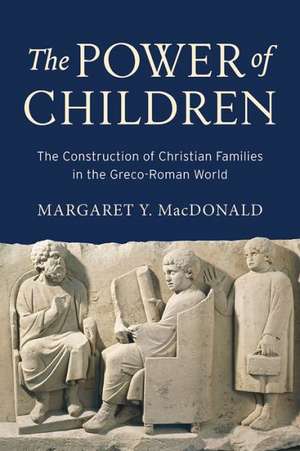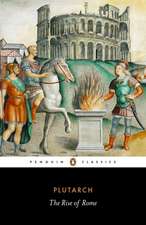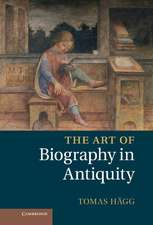The Power of Children: The Construction of Christian Families in the Greco-Roman World
Autor Margaret Y. MacDonalden Limba Engleză Hardback – 14 sep 2014
Preț: 434.48 lei
Nou
Puncte Express: 652
Preț estimativ în valută:
83.15€ • 90.29$ • 69.84£
83.15€ • 90.29$ • 69.84£
Carte disponibilă
Livrare economică 01-15 aprilie
Preluare comenzi: 021 569.72.76
Specificații
ISBN-13: 9781481302234
ISBN-10: 148130223X
Pagini: 248
Dimensiuni: 152 x 228 x 25 mm
Greutate: 0.55 kg
Editura: Baylor University Press
Colecția Baylor University Press (US)
ISBN-10: 148130223X
Pagini: 248
Dimensiuni: 152 x 228 x 25 mm
Greutate: 0.55 kg
Editura: Baylor University Press
Colecția Baylor University Press (US)
Recenzii
"In The Power of Children, Margaret MacDonald continues her previous work on early Christian families and house churches, probing deeper into what we know and can surmise about the most silent members of early Christian communities. The Power of Children is the best book available on children, households, and the household codes in early Christianity." -- Carolyn Osiek, Brite Divinity School, Emerita
"In this stimulating and groundbreaking book, Margaret MacDonald brings children to the forefront of early Christian history, seeking them out in the margins and shadows of the text and bringing them into the center. The Power of Children is not only a compelling account of house churches as complex multigenerational communities but also a demonstration of how placing children at the center opens up the liberating potential of New Testament texts." -- Terence L Donaldson, Lord & Lady Coggan Professor of New Testament Studies, Wycliffe College, University of Toronto
"This careful study shines new light on the multiple and overlapping identities of first-century church members. MacDonald's perceptive analysis gives us deeper understanding of the texture of life in the early church that calls us to recognize the complexities of the domestic and ecclesial lives of those early believers. Every study of these texts and all constructions of life in the early church will need to be in conversation with this superb book." -- Jerry L Sumney, Professor of Biblical Studies, Lexington Theological Seminary
MacDonald offers biblical scholarship at its best: nuanced, multidisciplinary, detailed, informed, critically engaged, and insightfully reasoned. -- Choice
MacDonald's analysis is careful and cogent, her conclusions measured (respecting the limits of the evidence), and her approach fully informed by relevant ancient evidence and scholarly work. -- Larry Hurtado, Emeritus Professor of New Testament Language, Literature & Theology, The University of Ediburgh -- https://larryhurtado.wordpress.com
Here is a deeply researched and informative study that casts light on an overlooked dimension of early Christianity, namely, the place of children and their influence in the life and traditions of the church in its formative period. -- Dianne Bergant, CSA -- The Bible Today
A wealth of insight -- Amy L. B. Peeler, Wheaton College -- Journal of the Evangelical Theological Society
"In this stimulating and groundbreaking book, Margaret MacDonald brings children to the forefront of early Christian history, seeking them out in the margins and shadows of the text and bringing them into the center. The Power of Children is not only a compelling account of house churches as complex multigenerational communities but also a demonstration of how placing children at the center opens up the liberating potential of New Testament texts." -- Terence L Donaldson, Lord & Lady Coggan Professor of New Testament Studies, Wycliffe College, University of Toronto
"This careful study shines new light on the multiple and overlapping identities of first-century church members. MacDonald's perceptive analysis gives us deeper understanding of the texture of life in the early church that calls us to recognize the complexities of the domestic and ecclesial lives of those early believers. Every study of these texts and all constructions of life in the early church will need to be in conversation with this superb book." -- Jerry L Sumney, Professor of Biblical Studies, Lexington Theological Seminary
MacDonald offers biblical scholarship at its best: nuanced, multidisciplinary, detailed, informed, critically engaged, and insightfully reasoned. -- Choice
MacDonald's analysis is careful and cogent, her conclusions measured (respecting the limits of the evidence), and her approach fully informed by relevant ancient evidence and scholarly work. -- Larry Hurtado, Emeritus Professor of New Testament Language, Literature & Theology, The University of Ediburgh -- https://larryhurtado.wordpress.com
Here is a deeply researched and informative study that casts light on an overlooked dimension of early Christianity, namely, the place of children and their influence in the life and traditions of the church in its formative period. -- Dianne Bergant, CSA -- The Bible Today
A wealth of insight -- Amy L. B. Peeler, Wheaton College -- Journal of the Evangelical Theological Society
Cuprins
1. Introduction: Codes and Children 2. Small, Silent, but Ever Present: Slave Children in Colossians 3:18-4:1 3. Socialization and Education: The Nurture, Teaching, and Discipline of Children in Ephesians 5:21-6:4 4. The House Church as Home School: The Christian Assembly and Family in Pastorals 5. Conclusion: How Remembering the Little Ones Changes Things
















